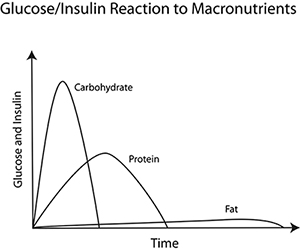Reversing Diabetes, Insulin Resistance, and Obesity – What’s the Chance?
by Carol Thompson

On the world stage, health professionals are gaining new insights into weight gain and obesity. In Canada, however, we seem to be a bit slow on the draw when it comes to following suit. The current attitude among many, including most health professionals, is one that blames heavy people for their own situation. If they could just control themselves, they wouldn’t be over weight and they have no motivation to change. “The blame, if we have to extend some, has been with our [medical] advice,” says Dr S Hallberg, medical director and founder of the Indiana University Arnett Health Medical Weight Loss Program. She explains that, “Obesity is a disease, not something created by lack of character.” To summarize, it is a hormonal disease that primarily involves the hormone insulin.
 The dilemma arises when a person becomes resistant to the effects of insulin, referred to as insulin resistance (IR), which if unchecked, eventually becomes diabetes. Insulin resistance explained is when the body starts having more and more difficulty getting glucose into the cells where it is needed for fuel. The corresponding physiological response is for the body to produce more insulin. In essence, because the cells are basically starving, it becomes understandable how and why higher insulin levels trigger an insatiable hunger. To add further insult to injury, insulin is our fat-storage hormone that turns the excess blood sugars to fat. Can you see how this could become a vicious unbreakable cycle? Tracing this problem back, if we did not have so much glucose for the body to deal with, we would not have the amount of insulin released. Essentially, IR is a state of carbohydrate intolerance and diabetes can be seen as a state of carbohydrate toxicity. With carbohydrate toxicity being the problem, informed doctors and medical researchers are questioning the recommendation for IR people and diabetics to continue eating high carbohydrate foods that are causing the problems. It doesn’t make sense. The dilemma arises when a person becomes resistant to the effects of insulin, referred to as insulin resistance (IR), which if unchecked, eventually becomes diabetes. Insulin resistance explained is when the body starts having more and more difficulty getting glucose into the cells where it is needed for fuel. The corresponding physiological response is for the body to produce more insulin. In essence, because the cells are basically starving, it becomes understandable how and why higher insulin levels trigger an insatiable hunger. To add further insult to injury, insulin is our fat-storage hormone that turns the excess blood sugars to fat. Can you see how this could become a vicious unbreakable cycle? Tracing this problem back, if we did not have so much glucose for the body to deal with, we would not have the amount of insulin released. Essentially, IR is a state of carbohydrate intolerance and diabetes can be seen as a state of carbohydrate toxicity. With carbohydrate toxicity being the problem, informed doctors and medical researchers are questioning the recommendation for IR people and diabetics to continue eating high carbohydrate foods that are causing the problems. It doesn’t make sense.
Before going on to look at what the solution is, it is important to understand a few things. Food falls into three basic macronutrient categories: carbs, proteins, and fats. Carbs cause a significant spike in blood glucose and insulin levels, while proteins cause considerably less, and fats cause almost no significant rise in blood glucose and insulin levels. The other term to understand is “essential nutrients.” These are nutrients we must have to function and can not be made from something else. Essential nutrients are amino acids (proteins) and fat. Carbs, however, are not an essential nutrient. Through a physiological process, called gluconeogenesis, our body can make its own glucose, therefore negating the requirement for any carbs.
Now, with this basic comprehension of biochemistry, it becomes understandable why many doctors are starting to recommend to their patients an extreme reduction of carbohydrates, replacing them with—yes, you guessed it—FATS. To their utter astonishment, not only are these doctors reversing insulin resistance and weight gain in their patients, they are able to completely remove diabetics from their medication while witnessing remarkably impressive improvements to their patient’s health, across the board. They see increased HDL levels and reductions of LDL, triglycerides, and inflammatory markers, all while experiencing increased overall energy, a result of a significantly higher production of ATP (the cells energy packets) from fat metabolism over sugar metabolism. With such incredibly amazing outcomes, some countries have adopted this way of eating as their new dietary guidelines. Sweden was the first to do so after rigorously scrutinizing 16,000 studies showing positive outcomes.
Not only is this high fat, low carbohydrate way of eating showing incredible health benefits for those with IR, obesity, and diabetes, it is being rigorously tested and quickly gaining a reputation for its beneficial results in cancer treatment, heart disease, Alzheimer’s, and other inflammatory diseases. While this way of eating is not particularly difficult, it does require some commitment, and information that is beyond the reach of this short article. To investigate further if it might be right for you, please contact Carol for more information. She has had her own journey with IR, obesity, and IBS, and as a health coach she can help guide you through the process to ensure your success.
Carol Thompson, who lives in Saskatoon, has engaged in healthy lifestyles and holistic living her entire adult life. Her passion for health and healing lead her to studies in homeopathic medicine with the Devon School of Homeopathy in England, health sciences at the University of Saskatchewan, and childbirth/midwifery/fertility education. Her enthusiasm for health is reflected in her lifelong work as a teaching assistant in the department of obstetrics/gynecology at Royal University Hospital, Saskatoon, health coach and homeopathic consultant, director with a fertility-related non-profit organization, doula/midwife, and political and community activist in client-centred health care. To contact her, call (306) 280-2160 or email: cadithompson@hotmail.com.
|
